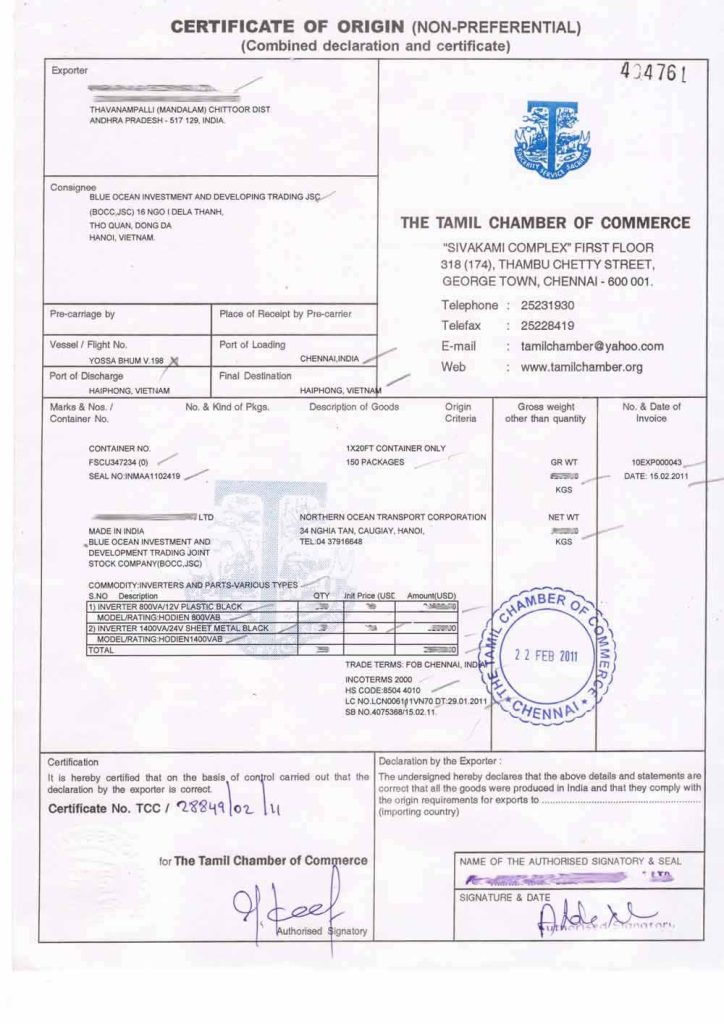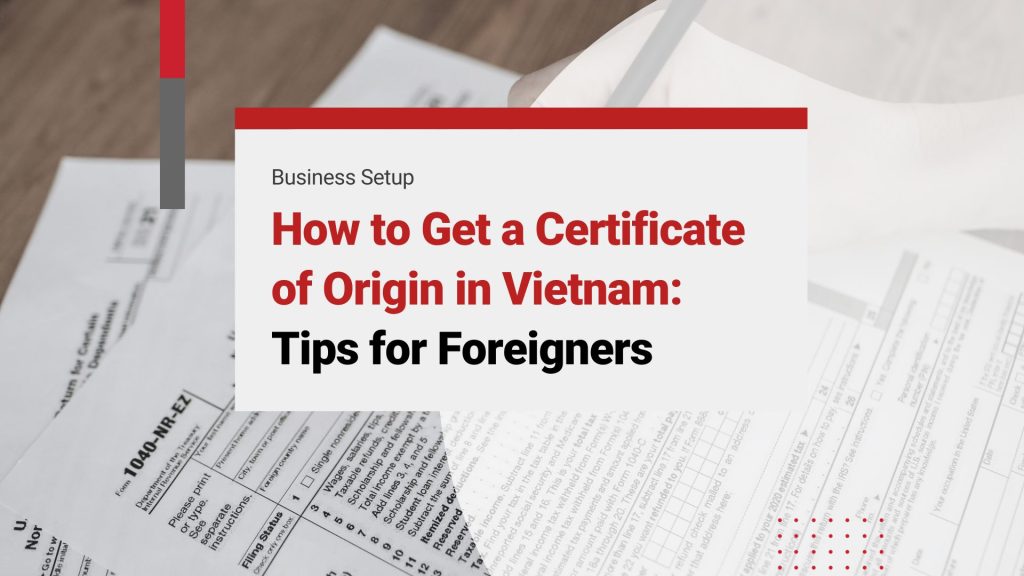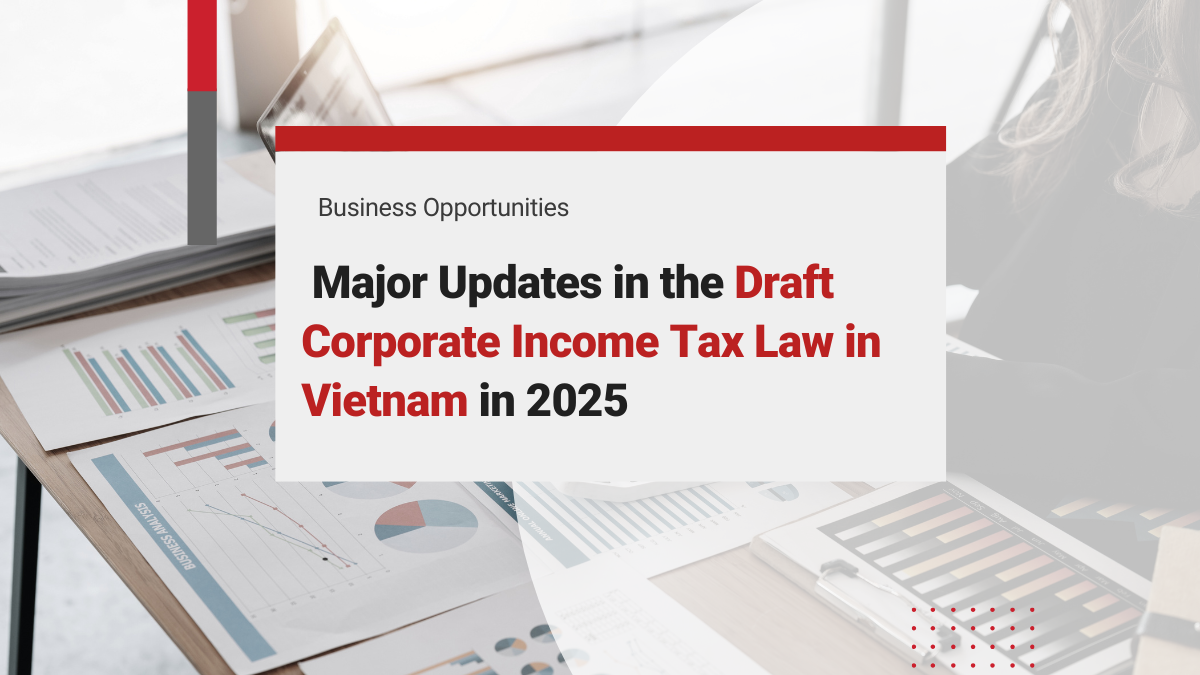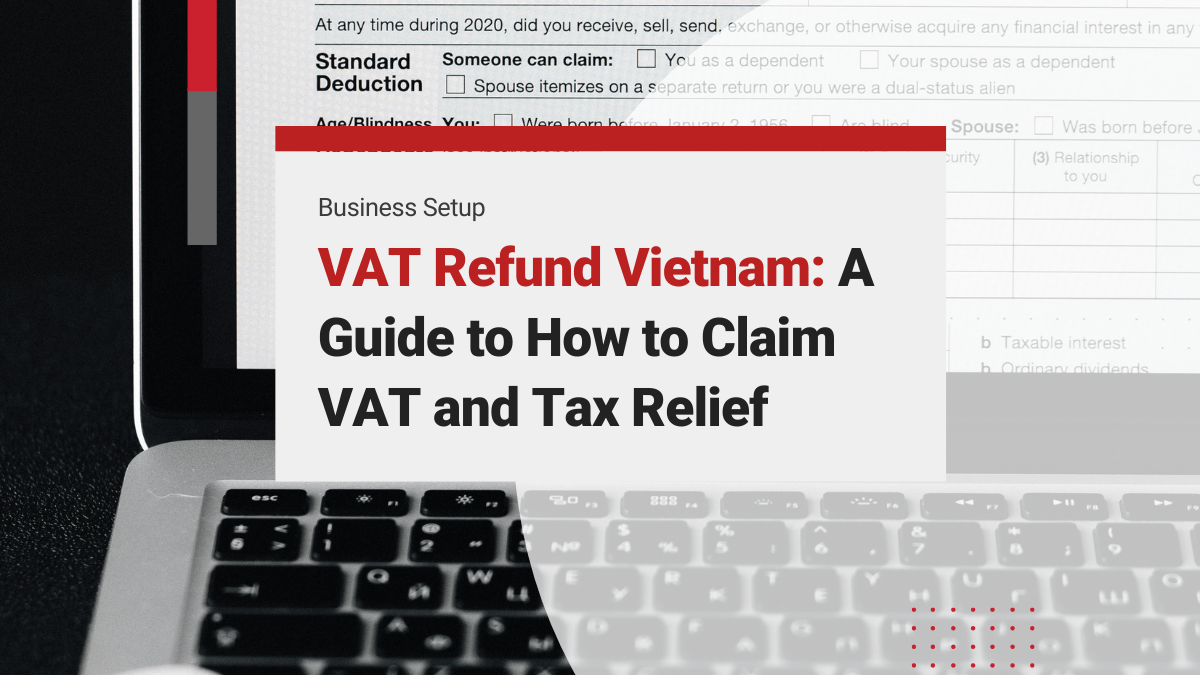A Certificate of Origin (C/O) is an official document that tells where the goods were manufactured or produced. Since it dictates the tariffs and trade conditions imposed by importing nations, a C/O is essential for exporters in Vietnam. With a C/O in hand, trade partners and customs officials are able to confirm that items comply with import laws or meet origin requirements for duty preferences.
Many nations require a separate C/O issued by an authorised entity to give better tariffs or comply with import regulations, even though commercial invoices already indicate the origin. Therefore, it is essential to confirm the legitimacy and correctness of a C/O. Otherwise, there may be customs delays, fines, or the loss of trade advantages.
Importing or Exporting from Vietnam? Find out InCorp Vietnam’s Product Registration Services
Overview of Certificate of Origin in Vietnam
According to FTAs (free trade agreements) negotiated between Vietnam and other nations, a notarised certificate of origin in Vietnam may drastically lower product duties or taxes, enabling importers to take advantage of specific tax advantages or other preferential treatments. However, a valid certificate of origin issued in Vietnam may be used to prevent international imports from certain restricted nations.
Beginning from May 5, The Ministry of Industry and Trade of Vietnam or the Chamber of Industry and Commerce, is officially in charge of providing foreign investors or companies in Vietnam with a certificate of origin. This kind of certificate is also available from other recognised institutions or organisations. Below is the form of Certificate of Origin in Vietnam:

Read More: The Definitive Guide to Vietnam’s 16 Active Free Trade Agreements
Procedure for Applying for a Certificate of Origin in Vietnam
All business owners must do everything listed below to get a certificate of origin:
Essential Checklist to Review Before Application
- Identify the origin and applicable regulations for your goods
- Understand the item’s Harmonized System (HS) code
- Analyze the FTA with the importing country and any associated taxes
- Compare tax rates to pick the best tax incentive format
- Verify product compliance with the importing nation’s legislation and check if they are permitted
Why Need a C/O in Vietnam?
- Under FTAs, import duties are reduced or eliminated.
- Meet the destination nations’ import regulations
- Boost the speed of customs clearance
- Establish trust as an authentic exporter.
Updates Required by Decree 31/2018/NĐ-CP
Decree 31/2018/NĐ-CP mandates that traders adhere to certain rules when it comes to upgrading their profiles:
- If there’s any change to the trader’s profile, it must be updated. Changes include the company name, address, business license, contact details, production capacity, or product scope.
- Before filing a new application, these changes must be reported to the agency or organisation that granted the Certificate of Origin (C/O) or updated via the National Single Window portal: vnsw.gov.vn.
- To remain active in the system, the trader’s profile needs to be updated or reconfirmed every two years if nothing changes.
The VietNam National Single Window Portal
Ever since becoming the standard practice for eC/O application, the VietNam National Single Window Portal has gone through ever-increasing implementation by The Customs Authority, connecting Vietnam’s trade and commerce with the ASEAN Single Window mechanism.
As the new-and-improved version of eCoSys, the National Single Window allows traders to submit documents and receive C/Os electronically, providing much-needed benefits in the current landscape:
- Streamlining the submission process, reducing costs.
- Eliminating the needs for physical documentation and direct submission, reducing wait time and uncertainty.
- Covering over 188 administrative procedures across 13 ministries, expanding capabilities in customs clearance and cross-border trading.
- Easier communications between traders and the Ministry of Industry and Trade (for export e-C/Os) or the exporting country (for import e-C/Os).
Enhanced Oversight and Compliance Monitoring
The Vietnamese government has strengthened oversight procedures in response to increased trade volumes and free trade agreements:
- Data from exporters is now cross-checked against other national databases (such as those for business registration, taxes, and customs).
- Authorities are concentrating on preventing fraud, especially regarding misrepresented goods or false claims of origin.
- Failure to comply may lead to: C/O issuance delays, Application rejections, Potential fines or penalties.
This emphasises how crucial it is to keep current and accurate records.
Tips for Exporters Using the VietNam National Single Window
Exporters should adhere to these standard practices to guarantee a seamless and legal VietNam National Single Window experience:
- Review and update your trader profile on vnsw.gov.vn regularly.
- Make sure that profile information and formal documents, such as:
- Certificate of Business Registration
- Catalogues of products
- Details about the factory
- Assign a responsible employee or compliance team to oversee applications and updates.
- Keep up with the Ministry of Industry and Trade’s (MOIT) announcements.
- In the event of audits or demands for verification, keep the supporting documentation and proof for origin claims.
First-Time Traders: Required Business Documents for Certificate of Origin Application
If you are a trader applying for a Certificate of Origin for the first time, you have to:
Step 1: Register the trader’s profile with the organization or agency issuing the Certificate of Origin. The trader’s profile must be legitimate and complete for issuing the Certificate of Origin
The trader profile includes: Article 13.1 Decree 31/2018/NĐ-CP (vnsw.gov.vn)
How to submit: Article 13.2 Decree 31/2018/NĐ-CP
The Ministry of Industry and Trade encourages business owners to create e-trader profiles for streamlined operations. Businesses have two options when applying: they can apply online at vnsw.gov.vn or opt for offline submission, either by directly visiting the relevant office or through postal mail. If setting up an e-trader profile is not feasible, traders have the alternative to submit their dossier in person at the office or organization responsible for issuing the Certificate of Origin.
- (Online) Once submitted, the local Import-Export Management Department will review and approve the trader’s profile within 24 hours. Following this approval, the company can then proceed to submit the second step of the application process.
- (Offline) While there is no specific legal timeframe for processing offline submissions, it is generally understood that this method takes longer compared to online submissions. This delay is due to the various stages involved, such as mailing the application, the receiving stage at the agencies, and the subsequent transfer to relevant departments.
According to Decree 31/2018/NĐ-CP, traders must update any changes to their profile on the National Single Window portal at vnsw.gov.vn or notify the authority that issued their Certificate of Origin (C/O). Even if there are no changes, the trader profile must still be reviewed and updated every two years.
Step 2: Request for issuance of C/O (Certificate of Origin)
Article 15 Decree 31/2018/NĐ-CP outlines the following details regarding the Certificate of Origin (C/O):
- Validity Period: The C/O is valid for 12 months from the date of its issuance.
- Submission Methods: Applicants have the option to submit their C/O applications either online or offline. For offline submissions, they can send their application directly to the concerned office or via postal mail.
- Processing Time: As per the legal stipulations, receiving a physical (paper) certificate takes about 8 working hours when submitted in person. If the certificate is sent via postal mail, it typically takes around 24 hours for delivery.
Submitting New Certificate of Origin Application Dossiers as Per Article 15 Decree 31/2018/NĐ-CP
If a trader is requesting a Certificate of Origin (C/O) for the first time, for goods that have already been initially exported, or for changeable goods (items that may undergo changes in quantity norms, weight norms, HS codes, value, or supply of input or output materials with each C/O issuance), the application dossier must include the following:
- A fully filled-out application for the issuance of a C/O using Form No.04
- A sample C/O completed and filled
- An export customs declaration on paper. A copy of the customs declaration is optional if the exported goods are exempt from customs
- A copy of the commercial invoice (with trade’s stamp to signify a true copy of the original)
- A copy of a transport document that is similar to a bill of lading and has been verified by the trade as a true copy of the original if the trader is missing that document.
- A thorough list of exploited products that meet the non-preferential origin standards or preferential origin regulations using the form required by the Ministry of Industry and Trade.
- If the original materials are utilized in a later step to create another good, a declaration of origin must be supplied by the maker or supplier using the form recommended by the Ministry of Industry and Trade
- A suitable manufacturing process copy (certified by the trader as a replica of the original)
- The issuing authority may request that the applicant submit copies of the following documents (each authenticated by the trader as a replica of the originals)*
(*) Note: If an applicant hasn’t yet submitted all the required documents, they can still do so within 15 working days after the Certificate of Origin (C/O) is issued. However, if the applicant doesn’t provide the additional documents within these 15 days, the issuing authority will cancel the C/O. Also, if the issuing authority has doubts about the authenticity of the documents submitted for the C/O, they can ask the applicant to provide the original documents for verification. The issuing authority will consider issuing a C/O for goods stored in bonded warehouses in Vietnam that are to be shipped to countries with which Vietnam has trade agreements.
- A duplicate of a bonded warehouse entry or discharge with the customs authority’s certification confirming the arrival of the goods at the export checkpoint (stamped by the trader as a replica of the original)
- A document of the agreement or designation made by a Vietnamese trader to deliver a shipment to the importer in a nation, group of nations, or region mentioned in an international treaty ratified by Vietnam (stamped as a true copy of the original by the trader).
- Suppose the goods qualify for the preferential rules of origin. In that case, the issuing authority may consider issuing C/O to exported goods and imported goods of exporting and processing enterprises, processing and exporting zones, bonded warehouses, free trade zones, and other separate customs zones maintaining export or import relationships with domestic zones.
Reissuing a Certificate of Origin in Case of Loss or Expiry
Case 1: Lost, misplaced, or damaged documents outlined in Article 18.1 of Decree 31/2018/NĐ-CP
- Submit a Re-issuance Application: This should include a detailed explanation for why you need them to reissue the Certificate of Origin. The justification should clearly outline the reasons such as loss, expiry, or damage of the original document.
- Requirements for the Reissued Certificate: The reissued Certificate of Origin must be clearly marked with “CERTIFIED TRUE COPY”. It should also reference the number and date of issue of the original Certificate of Origin that was lost, expired, or damaged.
- Processing Timeframe: The processing of the application for a reissued C/O will take approximately 4 working hours, starting from the time the application is received.
- Validity Period: The validity of the reissued Certificate of Origin is capped at one year from the date it is delivered.
Case 2: Expired C/O outlined in Article 15.2 of Decree 31/2018/NĐ-CP
- Application form
- Fully-filled certificate of origin copies
- Receipts and note cards
- Old certificate of origin
- Other documents as proof of reasons for the re-issuance of the certificate
Declare the certificate of origin online outline in Article 16 Decree 31/2018/NĐ-CP
Traders can submit application dossiers for Certificates of Origin using the electronic forms found on the websites of the agencies and organizations that issue Certificates of Origin, including:
Step 1: Assess the issuing authority’s website designated by the Ministry of Industry and Trade at vnsw.gov.vn or another location.
Step 2: You could select either of these two possibilities:
- Option 1: Fill out the online application form in the system for electronic C/O issuing.
- Option 2: To the electronic C/O issuance system, attach an application for C/O issuance. The digital signature provided by the appropriate authority must certify these documents. The issuing officer does not require that you present tangible copies of these documents.
Issuance of Certificate of Origin upon Application Approval
Duration:
The issuing authority must notify the applicant about the outcome of the system’s processing within 6 working hours when an appropriate and legitimate electronic application is submitted.
The issuing authority must provide the applicant with a hardcopy of the processing outcome within 2 working hours of receiving a correctly completed and valid application requesting a C/O and a hardcopy of the C/O.
Entire process:
- Submit online: faster, less than three working days. Through the postal
- Send direct documents: may take three working days.
Conclusion
A Certificate of Origin (C/O) is an essential document in international trade, especially for businesses engaging in exports from Vietnam. This certificate serves as a formal declaration of where a product is made. With a C/O, one will be able to determine the tariff and trade conditions applied for goods sent abroad. The importance of a C/O stems from its role in implementing taxes and trade measures that are part of Free Trade Agreements (FTAs) established between Vietnam and other countries.
These agreements often allow for reduced tariffs or other favorable trade terms, but to benefit from them, exporters must prove the origin of their goods – this is where the C/O comes in handy. It ensures that the benefits of FTAs, such as lowered tariffs, are correctly applied to goods that qualify, resulting in smoother and more cost-effective international trade.
In Vietnam, it is quite straightforward to obtain a Certificate of Origin. You have the option to apply in person at a government office, where you can receive guidance and support from officials. Alternatively, for convenience and efficiency, you may apply online through the government’s dedicated portal at vnsw.gov.vn. The online platform is designed to make the application process quicker and more accessible, a digital portal for traders to submit necessary documents and information.

clients worldwide

professional staff

incorporated entities in 10 years

compliance transactions yearly
Learn the Right Setup for Business
Expansion in the Vietnam
Frequently Asked Questions
How do I get a Certificate of Origin?
- To obtain a Certificate of Origin (CO) in Vietnam, you must apply through an authorized agency such as the Vietnam Chamber of Commerce and Industry (VCCI) or the Ministry of Industry and Trade (MOIT). You will need to submit documents including the commercial invoice, bill of lading, packing list, and a completed CO application form. If granted, the CO certifies that goods were produced or processed in Vietnam and may allow preferential tariffs under free trade agreements. The process can typically be done online or in person, depending on the issuing agency.
What is a Certificate of Origin in Vietnam?
- A Certificate of Origin (C/O) in Vietnam is an official document issued by authorized Vietnamese agencies that certifies the country of origin of exported goods. It is used to prove that the goods meet specific origin criteria under trade agreements, allowing importers in partner countries to claim preferential tariff treatment.






